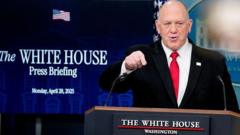Amid mounting violence in Ukraine, President Trump has publicly expressed discontent with Russian aggression in Kyiv, characterizing the recent attacks as unnecessary and poorly timed. The comments came shortly after an American proposal favoring Russia was floated to Ukraine's leadership. While emphasizing a desire to mediate and mitigate further conflict, Trump acknowledged potential concessions crucial to peace, though decisions regarding Crimea remain contentious. European allies continue to assert their commitment to supporting Ukraine, regardless of U.S. political shifts.
Trump's Urgent Appeal to Putin Amid Kyiv Attacks: 'STOP!'

Trump's Urgent Appeal to Putin Amid Kyiv Attacks: 'STOP!'
In a recent social media post, President Trump urged Vladimir Putin to cease missile and drone strikes on Kyiv, which resulted in at least 12 fatalities and 90 injuries.
In a significant escalation of hostilities, Kyiv faced the deadliest attack in nearly a year, as Russian missile and drone strikes led to the tragic loss of life and injuries. In reaction to this aggression, President Trump made a pointed statement on social media, directly addressing Russian President Vladimir Putin: "Vladimir, STOP!" The former President condemned the attacks, identifying them as unnecessary and poorly timed, reflecting heightened tensions in the ongoing conflict.
Trump’s remarks emerged shortly after he and his senior advisors reportedly pressured Ukrainian President Volodymyr Zelensky to consider a controversial U.S.-designed peace proposal that would tilt favorably towards Russia. During a briefing in the Oval Office, Trump clarified his lack of allegiance to either Russia or Ukraine, expressing a singular goal of ending the war and prioritizing humanitarian concerns. He suggested that Putin had made a significant concession—that is, refraining from further territorial ambitions beyond Ukraine.
One particularly contentious point is the status of Crimea, which Putin has claimed. Should Trump recognize Russia's assertion over the territory, it would undermine a decade of established U.S. foreign policy and set a troubling precedent of legitimizing border changes achieved through military force. For Ukraine, such acknowledgment has been largely unacceptable.
As discussions unfold, European officials are closely monitoring the situation, underscoring the integral role of a stable Ukraine in securing European interests. They have indicated preparedness to continue backing Kyiv even in the eventuality of reduced American involvement in peace negotiations.
Trump’s remarks emerged shortly after he and his senior advisors reportedly pressured Ukrainian President Volodymyr Zelensky to consider a controversial U.S.-designed peace proposal that would tilt favorably towards Russia. During a briefing in the Oval Office, Trump clarified his lack of allegiance to either Russia or Ukraine, expressing a singular goal of ending the war and prioritizing humanitarian concerns. He suggested that Putin had made a significant concession—that is, refraining from further territorial ambitions beyond Ukraine.
One particularly contentious point is the status of Crimea, which Putin has claimed. Should Trump recognize Russia's assertion over the territory, it would undermine a decade of established U.S. foreign policy and set a troubling precedent of legitimizing border changes achieved through military force. For Ukraine, such acknowledgment has been largely unacceptable.
As discussions unfold, European officials are closely monitoring the situation, underscoring the integral role of a stable Ukraine in securing European interests. They have indicated preparedness to continue backing Kyiv even in the eventuality of reduced American involvement in peace negotiations.























